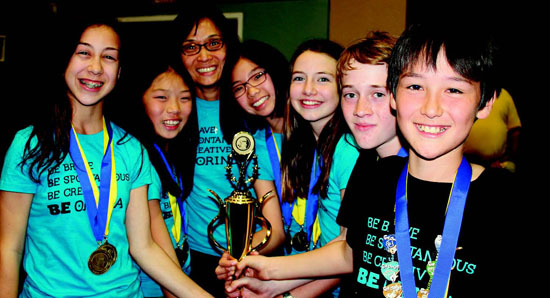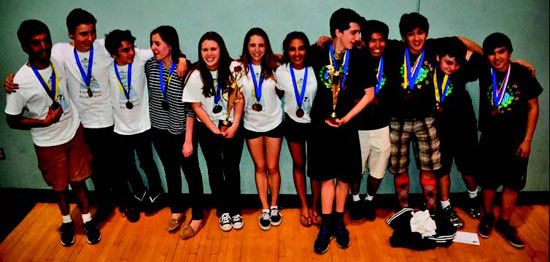 |
|
|
The Orinda Intermediate School sixth-grade team, from left: Emma MacKenzie, Alyssa Angsupanich, Mai Angsupanich, Chloe Lai, Keira Taylor, James Donn and Kent Schechter. Photos provided
|
|
|
|
|
|
Eight Lamorinda Odyssey of the Mind teams competed among 210 teams in the State Finals at UC Riverside March 28. Two Lafayette Rotary teams and two Moraga Rotary teams competed as well a third-grade team from Del Rey Elementary School, a fifth-grade team from Glorietta Elementary as well as a sixth-grade team and an eighth-grade team from Orinda Intermediate School.
 The OIS sixth-grade team of Alyssa Angsupanich, James Donn, Chloe Lai, Emma MacKenzie, Keira Taylor and Kent Schechter placed first in solving a technical problem requiring the construction of rubber band-powered devices. They will represent California in the World Finals May 20-23 at Michigan State University. The team was also awarded first place in style for their creative and artistic use of rubber bands in their props, costumes and musical presentation.
The OIS sixth-grade team of Alyssa Angsupanich, James Donn, Chloe Lai, Emma MacKenzie, Keira Taylor and Kent Schechter placed first in solving a technical problem requiring the construction of rubber band-powered devices. They will represent California in the World Finals May 20-23 at Michigan State University. The team was also awarded first place in style for their creative and artistic use of rubber bands in their props, costumes and musical presentation.
 The Glorietta team of Tom Inouye, Finn Jordan, Degen Naldoza, Jason Ritchey, Samantha Scott and Owen Younger placed third in a classics problem with a video-game spin on the Greek myth Pandora's Box, which the team creatively symbolized with a six-foot origami tree. Speaking of thinking outside the box. The Del Rey team of dinosaurs featuring Diego Aguilar, Cameron Berg, Sam Laudy, Issac Reader-Taatjes and Paul Stephan placed eighth among 14 teams in Division I of the rubber-band power problem, a solid performance for a third-grade team competing as the youngest age group in their division.
The Glorietta team of Tom Inouye, Finn Jordan, Degen Naldoza, Jason Ritchey, Samantha Scott and Owen Younger placed third in a classics problem with a video-game spin on the Greek myth Pandora's Box, which the team creatively symbolized with a six-foot origami tree. Speaking of thinking outside the box. The Del Rey team of dinosaurs featuring Diego Aguilar, Cameron Berg, Sam Laudy, Issac Reader-Taatjes and Paul Stephan placed eighth among 14 teams in Division I of the rubber-band power problem, a solid performance for a third-grade team competing as the youngest age group in their division.
 The OIS eighth-grade team of Luca Argast, Margaux Clarke, Ariel Everette, Jane Fong and Sonika Renjen placed ninth among 20 teams in a performance problem involving the old art of silent movies; imagine producing and presenting a humorous movie with no sound effects or spoken lines.
The OIS eighth-grade team of Luca Argast, Margaux Clarke, Ariel Everette, Jane Fong and Sonika Renjen placed ninth among 20 teams in a performance problem involving the old art of silent movies; imagine producing and presenting a humorous movie with no sound effects or spoken lines.
 Lafayette Rotary (Division III) took first place at the state finals for the Pandora's Box problem and the Lafayette Rotary team (Division III) took first place for the Silent Movie problem. Each team also received the highest score for "Style" in their respective problem. The Pandora's Box team was also recognized with the Omer Award for exceptional creativity. Both teams will compete at the Odyssey of the Mind World Finals. Moraga Rotary Team A (Division III) finished third for the Pandora's Box problem and Moraga Rotary Team A (Division I) finished seventh for the Runaway Train problem.
Lafayette Rotary (Division III) took first place at the state finals for the Pandora's Box problem and the Lafayette Rotary team (Division III) took first place for the Silent Movie problem. Each team also received the highest score for "Style" in their respective problem. The Pandora's Box team was also recognized with the Omer Award for exceptional creativity. Both teams will compete at the Odyssey of the Mind World Finals. Moraga Rotary Team A (Division III) finished third for the Pandora's Box problem and Moraga Rotary Team A (Division I) finished seventh for the Runaway Train problem.
 For over 35 years, Odyssey of the Mind has provided creative problem-solving opportunities for students from kindergarten through college. The international educational program promotes creativity by challenging teams to solve divergent problems with more than one solution. The teams bring their solutions to competition on the local, state and World level. Thousands of teams from throughout the U.S. and from about 25 other countries participate in the program.
For over 35 years, Odyssey of the Mind has provided creative problem-solving opportunities for students from kindergarten through college. The international educational program promotes creativity by challenging teams to solve divergent problems with more than one solution. The teams bring their solutions to competition on the local, state and World level. Thousands of teams from throughout the U.S. and from about 25 other countries participate in the program.
 Each year, teams are formed and five new competitive problems are presented for teams to solve. These long-term problems are solved over weeks and months. Some of the problems are technical in nature, while others are artistic or performance based. On competition day, the teams are given eight minutes to present their long-term solutions in the form of a skit. They are also given an on-the-spot "spontaneous" problem to solve within five to ten minutes as a team. The combined long-term score, style score and spontaneous problem score determines the teams' standings in competition.
Each year, teams are formed and five new competitive problems are presented for teams to solve. These long-term problems are solved over weeks and months. Some of the problems are technical in nature, while others are artistic or performance based. On competition day, the teams are given eight minutes to present their long-term solutions in the form of a skit. They are also given an on-the-spot "spontaneous" problem to solve within five to ten minutes as a team. The combined long-term score, style score and spontaneous problem score determines the teams' standings in competition.
 The Odyssey of the Mind has its roots in the Industrial Design classes of Dr. Sam Micklus, Odyssey of the Mind founder. As a professor at Rowan University in New Jersey (formerly Glassboro State College), Dr. Micklus challenged his students to create vehicles without wheels, mechanical pie throwers and flotation devices that would take them across a course on a lake. He evaluated them not on the success of their solutions, but on the ingenuity applied and the risk involved in trying something new and different. Word spread and this led to the development of a creative problem-solving competition for school children.
The Odyssey of the Mind has its roots in the Industrial Design classes of Dr. Sam Micklus, Odyssey of the Mind founder. As a professor at Rowan University in New Jersey (formerly Glassboro State College), Dr. Micklus challenged his students to create vehicles without wheels, mechanical pie throwers and flotation devices that would take them across a course on a lake. He evaluated them not on the success of their solutions, but on the ingenuity applied and the risk involved in trying something new and different. Word spread and this led to the development of a creative problem-solving competition for school children.
 All of the Odyssey of the Mind teams are coached by parent volunteers, but the solutions are entirely created by the team members without the help of others.
All of the Odyssey of the Mind teams are coached by parent volunteers, but the solutions are entirely created by the team members without the help of others.
 This year, Amy Inouye and Michael Kim took over the important role as the Odyssey of the Mind coordinators for all of Orinda. In addition to spreading word on the program, they coordinate membership registration for all five OUSD schools and Orinda Rotary Club (for non-OUSD students), organize team practices for the spontaneous component, and provide invaluable support to new coaches.
This year, Amy Inouye and Michael Kim took over the important role as the Odyssey of the Mind coordinators for all of Orinda. In addition to spreading word on the program, they coordinate membership registration for all five OUSD schools and Orinda Rotary Club (for non-OUSD students), organize team practices for the spontaneous component, and provide invaluable support to new coaches.
 Students and parents interested in forming teams next year can contact Amy Inouye at aei2pld@gmail.com to obtain more information. A GoFundMe page (http://www.gofundme.com/lafayetteOdyssey) has been setup to help raise funds to cover the costs for the Lafayette teams to compete at the World Finals.
Students and parents interested in forming teams next year can contact Amy Inouye at aei2pld@gmail.com to obtain more information. A GoFundMe page (http://www.gofundme.com/lafayetteOdyssey) has been setup to help raise funds to cover the costs for the Lafayette teams to compete at the World Finals.

|
| Lafayette Rotary team members, from left: Amin Edraki, Peter Kintner, Jonah Kallen, Kate Kintner, Julia Husch, Sophie Mcglothlen, Aneesa Edraki, Dylan Orsolini, Alex Shimotake, Cristofer Holobetz, Jake Dohemann and Jonathan Holobetz. Not pictured: Morgan Orsolini and coaches Tina Edraki, Margaret Kintner and Suzanne Roady |

